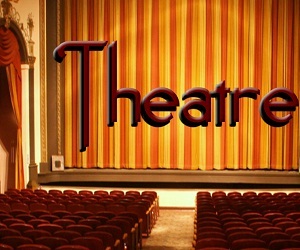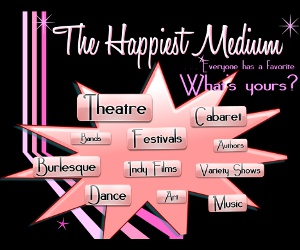Excuse me, excuse me, excuse me? Wait a minute now – what? Just what is Danny Mitarotondo’s new play, What the Sparrow Said, at CSV Latea, trying to say? Or is it really trying not to say anything? The language has certainly been put through a crafty shredder, stripping it of any natural clarity, eliptically hinting that there is more going on than is apparent, morphing into indigestible poetry, and flashily playing at nonsense while preventing any speaker from actually finishing a sentence. The actors rattle off their lines as if they were in some over-paced 1930s screwball comedy, overlapping sentences in a manner that defies clear communication and challenges listener comprehension. Strain as you will to grasp what is being said, it is all but hopeless. And when this difficulty is pointedly compounded by the decision to stage separate scenes on top of one another, and having characters in different scenes talking simultaneously so that your attention is split in the rising din, and you are forced to abandon at least one set of exchanges… well; really? Yeah, I get life can be confusing; chaotic even. Yes, and life can be annoying. Very annoying. Verisimilitude, however, is definitely not a part of this playwright’s vocabulary. Absurdism? Perhaps.
The story begins at the LA hospital bedside of an elderly dying woman, Hannah. Her two sons, have for reasons undeclared, drifted apart over the years. One, Danny, presently lives in New York. The other, Blaze, is by her side; but is he present? Blaze, a high-strung poetic type, seems incapable of confronting the fact of his mother’s imminent demise. He prattles on noisily about the small glorious minutiae of living, desperately eluding the matter to hand. Yes, he’s in denial. Yes, he’s annoying. He even turns off the audio monitor at his mother’s bed as he can’t stand the electric tone of her fading heartbeat. And when a young female visitor enters the ward to see another patient, he begins a frenetic courtship with her. Meantime, upstage, we are introduced to Danny, who has just inherited, to his great surprise, a Park Avenue apartment from someone he considered merely a passing acquaintance. Cynthia, the estate agent cum executrix, who possibly could be a sibling of the deceased, is gamefully making a play for him. Danny has newly broken up with his girlfriend, Kristen. There is a rapid-fire exchange between Cynthia and himself where he addresses her – is it confusedly? -as Kristen, and she even seems to change into her for the course of a galloping verse of poetry. Blaze’s seduction scene in the background meantime is continuing apace, and the separate scenes begin to vie for our attention. Not only are both situations intentionally unlikely, but the doctored language undertakes to unpick any emotional realism that might emerge, even as the big poignant themes of love and death are being dramatized. We are not prompted to care about any of these people. Danny leaves Cynthia. The old woman dies. Should it matter if Blaze may indirectly have contributed to his mother’s death by disengaging the monitor? Or that Cynthia is left bereft, weeping wretchedly in the foreground following Danny’s exit? The scene shifts.
Danny now is traveling across country to LA to attend his mother’s funeral. Enroute he meets several enigmatic women who speak obliquely about matters inconclusive. These roles are played by actresses from the earlier scenes, emphasizing the interchangeability of the characters life throws at us, or relates us to. Is that Cynthia behind those dark glasses, obfuscating about her connection with a brother? Could there be some portion of his mother in that eccentric lady Danny gives a ride to and who guides him to a cemetery? Every encounter is pregnant but undelivered. When Danny at last arrives in LA and meets Blaze for lunch at a restaurant from their past, the play finally comes a cropper. Blaze is behaving like an unhinged person. Is he schizophrenic, or merely speaking in the play’s poetic babble? As psychological realism has been jettisoned quite a while back it is impossible to know. Following a heated exchange, amped up by Blaze’s urgent provocations, and a tussle, we are treated to a vision of both brothers, broken men, in a palpating embrace of desperation. Danny’s words wither in his mouth as he pleads for anyone to help them, and darkness swallows them. Well excuse me; you cannot at last storm the heartstrings in a closing act unless you have first successfully plucked them in the course of the story. Or on another note, darkly absurd, is this final scene an intentional act of bathos?
There is no denying that Mitarotondo has devised an ingenious theatrical language here. The poetry does not work for me, but the eliptical exchanges have acuity and a comic vigor. The structural complexity is intriguing, as is his investigation of, shall we say, the relativity of relativity. There is much allusion to fracturing, fractals and refraction. Linguistically and formally the work integrates this interest, but it is at once itself refractive and refractory. The specter of an intensive workshop hangs over it, but perhaps it is not fully cooked. The actors must all work hard to put it across and there is a problem with vocal projection in some instances. Standouts are Brenda Currin as Hannah (a non-speaking role!) and as an eccentric fellow traveller, and Heather Oakley as Cynthia, who brings a welcome touch of neurotic comedy to the proceedings. Ambitious the work certainly is on the part of the director (Jenna Worsham) and the author, and that’s to be commended in this serious-minded production company. But perhaps the general problem with the show is endemic in the enterprise’s title, which most incongruously is The Common Tongue. Nothing could be less applicable to the production’s style. Regrettably it’s an unworkable mix of the intellectual and the emotional. It’s a cocktail that just won’t hunt.
What The Sparrow Said ran until August 26, 2011 as part of the New York International Fringe Festival.
~~~
What The Sparrow Said
Writer: Danny Mitarotondo
Director: Jenna Worsham
1h 30m
VENUE #4: Teatro LATEA








{ 0 comments… add one now }